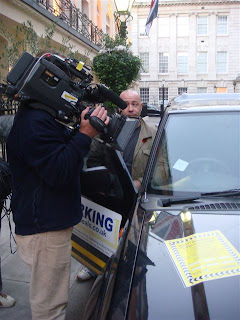
The 'parking industry' is unregulated and out of control.
Now this time it is a grandmother who has had her car seized ... because of fines racked up by a previous owner.
More ...This is just another example of how the DVLA and the enforcement industry do not and cannot interface to create a streamlined system, and an example of how you, the motorist, are being abused by a system which is ill-conceived and unworkable.
Just wait until the 'persistent offender' legislation kicks in ... a persistent offender being anyone with more than 3 unpaid Penalty Charge Notices ... and we will have more and more nightmare stories like the one above.
If you think it is not going to happen or statistically it won't happen to you ... let us have a look at the accuracy of the DVLA data base (thanks to No2ID for the content below). The response is from a DVLA official (my comments in bold):
"DVLA holds in excess of 36 million vehicle records and 47 million driver records, so as you can imagine, maintaining accuracy is extremely difficult, particularly when the Agency is totally dependant upon the motoring public for much of its information.
There is the first and most fundamental flaw ... entirely dependent on Joe Public for the information it holds. Joe Public forgets to post the letter, leaves it a few days etc. and the 'system' is affected.
DVLA takes its responsibility for providing accurate information to customers and stakeholders very seriously, and is continuously looking for ways to improve the quality of the information it holds. Over the last 6 years, there has been a progressive phasing-in of new initiatives aimed at improving accuracy.
But if Joe Public is the one who causes the system the most problems then there needs to be root and branch reform of the whole way vehicle registrations operate. Perhaps the US system where you own the registration number and it moves with you to your vehicle ... and local licensing centres control the transfer ... but it is politically sensitive as that could put thousands of jobs in Swansea under threat.
These include the introduction of Statutory Off Road Notification in 1998, the mandatory production of a registration document at licensing in 2003 and Continuous Registration in January 2004.
However, a single measure/level of accuracy is not appropriate because of the different measuring processes used by DVLA. The following information will give you an indication of how difficult it is to quote a single accuracy percentage. As a benchmark, DVLA conducted an Accuracy Survey in 2003. The results of the survey showed that 68% of the records on the vehicle database were perfectly correct in every aspect.
I love it when they play the percentage game. That means that 32% were not ... that is 15,040,000 driver records were not perfectly correct.
A further 22% contained spelling mistakes in name and address details or had out of date postcodes. However, these errors are minor in nature and, more importantly, do not stop mail being delivered or prevent police or manufacturers from tracing vehicle keepers in the event of an accident or a vehicle safety recall.
This, in effect, amounts to a 90% traceability level using the information on the vehicle database, which is extremely important in order for DVLA to meet its key objectives of helping to improve road safety and reduce vehicle crime.
90% traceability level means 10% are not traceable ... 4,700,000 vehicles / drivers. Now it becomes a concerns for enforcement agencies ... they cannot catch up with fine evaders BUT if you buy one of those 4.7m cars and correctly register it ... they will now catch up ... and you will be inconvenienced by either having to prove your innocence or having to recover an impounded car as illustrated by the story above.
Incidentally, the 2003 survey indicated that the main cause of inaccuracy on the vehicles database (as much as 10%) was as a result of vehicle keepers not informing DVLA when they sold/scrapped their vehicle or changed their address. Additionally, DVLA carries out a monthly monitoring exercise of the accuracy of information at data capture. The results show that DVLA staff consistently meets an accuracy level in excess of 97.5% each month. As you can see, there are 3 quite separate accuracy percentages; 68% perfect records, 90% traceable records and 97.5% records accurate at data capture, all of which are valid percentages, which are used for different purposes."
Linda Weaver
ACGB1
You have been warned ...
 ... and if you are disabled you are an easy target.
... and if you are disabled you are an easy target. 






.JPG) The picture on the left is of a car as it appeared on the front page of the Keswick Reminder.
The picture on the left is of a car as it appeared on the front page of the Keswick Reminder.














 Sunderland City Council's department of bizarre ideas has come up with another classic. This time 'someone' has decided that an 'exclusion zone' will be created in the City Centre between 12 midnight and 5am.
Sunderland City Council's department of bizarre ideas has come up with another classic. This time 'someone' has decided that an 'exclusion zone' will be created in the City Centre between 12 midnight and 5am.







